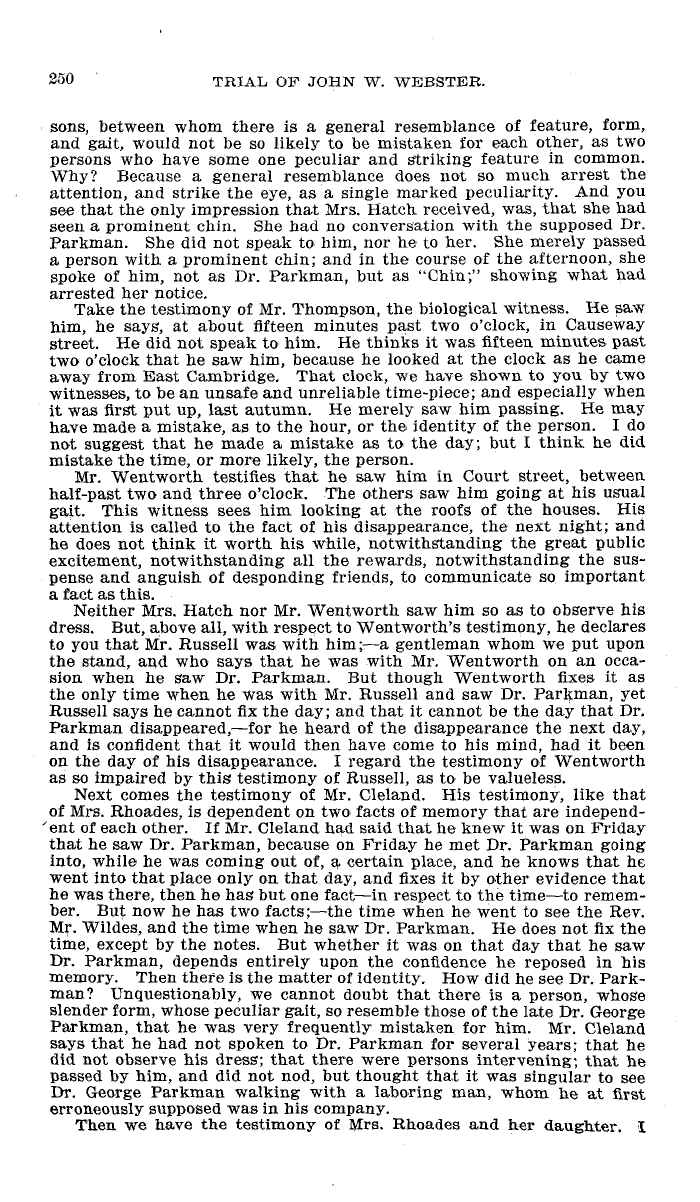|
050
TRIAL OF JOHN W. WEBSTER.
sons, between whom there is a general resemblance of feature, form,
and gait, would not be so likely to be mistaken for each other, as two
persons who have some one peculiar and striking feature in common.
Why? Because a general resemblance does not so much arrest the
attention, and strike the eye, as a single marked peculiarity. And you
see that the only impression that Mrs. Hatch received, was, that she had
seen a prominent chin. She had no conversation with the supposed Dr.
Parkman. She did not speak to him, nor he to her. She merely passed
a person with a prominent chin; and in the course of the afternoon, she
spoke of him, not as Dr. Parkman, but as "Chin;" showing what had
arrested her notice.
Take the testimony of Mr. Thompson, the biological witness. He saw
him, he says, at about fifteen minutes past two o'clock, in Causeway
street. He did not speak to him. He thinks it was fifteen minutes past
two o'clock that he saw him, because he looked at the clock as he came
away from East Cambridge. That clock, we have shown to you by two
witnesses, to be an unsafe and unreliable time-piece; and especially when
it was first put up, last autumn. He merely saw him passing. He may
have made a mistake, as to the hour, or the identity of the person. I do
not suggest that he made a mistake as to the day; but I think he did
mistake the time, or more likely, the person.
Mr. Wentworth testifies that he saw him in Court street, between
half-past two and three o'clock. The others saw him going at his usual
gait. This witness sees him looking at the roofs of the houses. His
attention is called to the fact of his disappearance, the next night; and
he does not think it worth his while, notwithgtanding the great public
excitement, notwithstanding all the rewards, notwithstanding the sus-
pense and anguish of desponding friends, to communicate so important
a fact as this.
Neither Mrs. Hatch nor Mr. Wentworth saw him so as to observe his
dress. But, above all, with respect to Wentworth's testimony, he declares
to you that Mr. Russell was with him; a gentleman whom we put upon
the stand, and who says that he was with Mr. Wentworth on an occa-
sion when he saw Dr. Parkman. But though Wentworth fixes it as
the only time when he was with Mr. Russell and saw Dr. Parkman, yet
Russell says he cannot fix the day; and that it cannot be the day that Dr.
Parkman disappeared,-for he heard of the disappearance the next day,
and is confident that it would then have come to his mind, had it been
on the day of his disappearance. I regard the testimony of Wentworth
as so impaired by this testimony of Russell, as to be valueless.
Next comes the testimony of Mr. Cleland. His testimony, like that
of Mrs. Rhoades, is dependent on two facts of memory that are independ-
ent of each other. If Mr. Cleland had said that he knew it was on Friday
that he saw Dr. Parkman, because on Friday he met Dr. Parkman going
into, while he was coming out of, q. certain place, and he knows that he
went into that place only on that day, and fixes it by other evidence that
he was there, then he has but one fact-in respect to the time-to remem-
ber. But now he has two facts; the time when he went to see the Rev.
Mr. Wildes, and the time when he saw Dr. Parkman. He does not fix the
time, except by the notes. But whether it was on that day that he saw
Dr. Parkman, depends entirely upon the confidence he reposed in his
memory. Then there is the matter of identity. How did he see Dr. Park-
man? Unquestionably, we cannot doubt that there is a person, whose
slender form, whose peculiar gait, so resemble those of the late Dr. George
Parkman, that he was very frequently mistaken for him. Mr. Cleland
says that he had not spoken to Dr. Parkman for several years; that he
did not observe his dress; that there were persons intervening; that he
passed by him, and did not nod, but thought that it was singular to see
Dr. George Parkman walking with a laboring man, whom he at first
erroneously supposed was in his company.
Then we have the testimony of Mrs. Rhoades and her daughter. I
|

